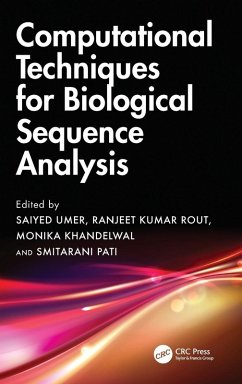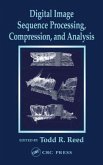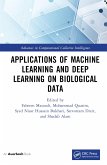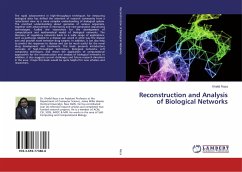Computational Techniques for Biological Sequence Analysis
Herausgeber: Umer, Saiyed; Khandelwal, Monika; Rout, Ranjeet Kumar
Computational Techniques for Biological Sequence Analysis
Herausgeber: Umer, Saiyed; Khandelwal, Monika; Rout, Ranjeet Kumar
- Gebundenes Buch
- Merkliste
- Auf die Merkliste
- Bewerten Bewerten
- Teilen
- Produkt teilen
- Produkterinnerung
- Produkterinnerung
This book provides an overview of basic and advanced computational techniques for analysing and understanding protein, RNA, and DNA sequences. This book acts as useful reference for bioinformaticians and computational biologists working in the field of molecular biology, genomics, and bioinformatics.
Andere Kunden interessierten sich auch für
![Biological Sequence Analysis Using the SeqAn C++ Library Biological Sequence Analysis Using the SeqAn C++ Library]() Andreas Gogol-DöringBiological Sequence Analysis Using the SeqAn C++ Library91,99 €
Andreas Gogol-DöringBiological Sequence Analysis Using the SeqAn C++ Library91,99 €![Biological Sequence Matching Biological Sequence Matching]() Nivit GillBiological Sequence Matching39,99 €
Nivit GillBiological Sequence Matching39,99 €![Digital Image Sequence Processing, Compression, and Analysis Digital Image Sequence Processing, Compression, and Analysis]() Todd R. Reed (ed.)Digital Image Sequence Processing, Compression, and Analysis60,99 €
Todd R. Reed (ed.)Digital Image Sequence Processing, Compression, and Analysis60,99 €![Applications of Machine Learning and Deep Learning on Biological Data Applications of Machine Learning and Deep Learning on Biological Data]() Applications of Machine Learning and Deep Learning on Biological Data131,99 €
Applications of Machine Learning and Deep Learning on Biological Data131,99 €![Reconstruction and Analysis of Biological Networks Reconstruction and Analysis of Biological Networks]() Khalid RazaReconstruction and Analysis of Biological Networks51,99 €
Khalid RazaReconstruction and Analysis of Biological Networks51,99 €![BIOLOGICAL IDENTIFICATION OF MONOZYGOTIC TWINS BIOLOGICAL IDENTIFICATION OF MONOZYGOTIC TWINS]() Veer Raj SainiBIOLOGICAL IDENTIFICATION OF MONOZYGOTIC TWINS31,99 €
Veer Raj SainiBIOLOGICAL IDENTIFICATION OF MONOZYGOTIC TWINS31,99 €![Sequence Alignment and HMM Sequence Alignment and HMM]() Mustafa DuranSequence Alignment and HMM32,99 €
Mustafa DuranSequence Alignment and HMM32,99 €-
-
-
This book provides an overview of basic and advanced computational techniques for analysing and understanding protein, RNA, and DNA sequences. This book acts as useful reference for bioinformaticians and computational biologists working in the field of molecular biology, genomics, and bioinformatics.
Produktdetails
- Produktdetails
- Verlag: CRC Press
- Seitenzahl: 212
- Erscheinungstermin: 17. Juni 2025
- Englisch
- Abmessung: 240mm x 161mm x 16mm
- Gewicht: 487g
- ISBN-13: 9781032630267
- ISBN-10: 1032630264
- Artikelnr.: 72542628
- Herstellerkennzeichnung
- Libri GmbH
- Europaallee 1
- 36244 Bad Hersfeld
- gpsr@libri.de
- Verlag: CRC Press
- Seitenzahl: 212
- Erscheinungstermin: 17. Juni 2025
- Englisch
- Abmessung: 240mm x 161mm x 16mm
- Gewicht: 487g
- ISBN-13: 9781032630267
- ISBN-10: 1032630264
- Artikelnr.: 72542628
- Herstellerkennzeichnung
- Libri GmbH
- Europaallee 1
- 36244 Bad Hersfeld
- gpsr@libri.de
Saiyed Umer is currently serving as an Assistant Professor in the Department of Computer Science and Engineering Aliah University, Kolkata, India. He was the Research Personnel at Indian Statistical Institute (ISI), Kolkata, India, from November 2012 to April 2017. He received a PhD Degree (Engineering executed in ISI Kolkata) from the Department of Information Technology at Jadavpur University, Kolkata, India, in March 2017. He earned B.Sc. (Hons) degree in Mathematics from Vidyasagar University, India, in 2005 and a Master of Computer Applications from the West Bengal University of Technology, India, in 2008 respectively. Dr Umer received an M.Tech degree from the University of Kalyani, India, in 2012. He has published several papers in peer-reviewed international and scientific journals in the field of Biometric, Affective Computing, Big-data research, Business Human Resource Management, and Computational Biology. His research interests include Computer Vision, Machine Learning, Deep Learning, and Business data analytics techniques. Ranjeet Kumar Rout is currently serving as Assistant Professor in the Department of Information Technology, Dr. B. R. Ambedkar National Institute of Technology, Jalandhar, Punjab, India. Formally, he was the Assistant Professor in the Department of Computer Science and Engineering, National Institute of Technology Srinagar, Hazratbal, India. He received his Ph.D. from the department of Information Technology of Indian Institute of Engineering Science and Technology Shibpur, West Bengal, India. Previously, he earned Post Graduate and bachelor's degree in computer science and Engineering from Biju Patnaik University of Technology, Odisha, India, in 2010 and 2005, respectively. Prior to working at NIT Srinagar, Dr. Ranjeet had research and teaching experience from Amity University Noida, National Institute Technology Jalandhar, and Indian Statistical Institute (ISI) Kolkata, India. His research interests include machine learning, deep learning, visual cryptography, and computational biology. He has published several papers in peer reviewed international and scientific journals in the field of non-linear Boolean functions and computational biology. Monika Khandelwal is currently an Assistant Professor in the Department of Computer Science and Engineering, Jaypee University, Solan, Himachal Pradesh, India. She earned her Ph.D. from the Department of Computer Science and Engineering at National Institute of Technology Srinagar, Hazratbal, India. She received her M.Tech. Degree in Computer Science and Engineering from Dr. B.R. Ambedkar National Institute of Technology Jalandhar, Punjab, India in 2016 and B.Tech. Degree in Computer Science and Engineering from Guru Jambheshwar University of Science & Technology, Hisar, Haryana, India. Prior to joining Ph.D. at NIT Srinagar, she had teaching experience from National Institute Technology Hamirpur and Malaviya National Institute of Technology Jaipur, India. She has published several papers in conferences, journals, and book chapters. Her research interests include machine learning, deep learning, bioinformatics, and computational biology. Smitarani Pati is working in the Instrumentation and Control Engineering on modeling, control, and optimization of industrial processes such as energy optimization using soft computing techniques. She earned her Ph.D. Degree at Instrumentation and Control Engineering from Dr. B.R. Ambedkar National Institute of Technology Jalandhar, Punjab, India. She received the B. Tech degree in electrical engineering from the Biju Patnaik University of Technology, Odisha, India, in 2011, the M.Tech degree in control and Instrumentation Engineering from Dr. B.R. Ambedkar National Institute of Technology Jalandhar, Punjab, India 2018. She has published several articles in international conferences and book chapters. Her current research interests include Energy modeling and optimization, design of distributed systems, and fault-tolerant controls.
About the Editors. Contributors. Chapter 1 Machine Learning and
Computational Models for the Prediction of Post-Translational Modification
Sites. Chapter 2 Application of Artificial Intelligence in Recognition of
Gene Regulation and Metabolic Pathways. Chapter 3 Assessment of Machine
Learning Algorithms in DNA Sequence Data Mining. Chapter 4 Efficient
Detection and Recuperation of Mental Health using X (Formerly Twitter) and
Fitbit Data-Based Recommendation System. Chapter 5 Role of Artificial
Intelligence in Detection of Congenital Diseases. Chapter 6 A Hybrid
Multi-Level Segmentation-Based Ensemble Classification Model. Chapter 7
Innovative Approaches to Bilirubin Detection. Chapter 8 Targeted
Immunization: Application of Machine Learning in Prediction of IL-4
Inducing Peptides. Chapter 9 Healthcare Portal-Django Framework for
Healthcare Management System. Chapter 10 Harnessing Machine Learning and
Deep Learning for DNA Sequence Analysis. Index.
Computational Models for the Prediction of Post-Translational Modification
Sites. Chapter 2 Application of Artificial Intelligence in Recognition of
Gene Regulation and Metabolic Pathways. Chapter 3 Assessment of Machine
Learning Algorithms in DNA Sequence Data Mining. Chapter 4 Efficient
Detection and Recuperation of Mental Health using X (Formerly Twitter) and
Fitbit Data-Based Recommendation System. Chapter 5 Role of Artificial
Intelligence in Detection of Congenital Diseases. Chapter 6 A Hybrid
Multi-Level Segmentation-Based Ensemble Classification Model. Chapter 7
Innovative Approaches to Bilirubin Detection. Chapter 8 Targeted
Immunization: Application of Machine Learning in Prediction of IL-4
Inducing Peptides. Chapter 9 Healthcare Portal-Django Framework for
Healthcare Management System. Chapter 10 Harnessing Machine Learning and
Deep Learning for DNA Sequence Analysis. Index.
About the Editors. Contributors. Chapter 1 Machine Learning and
Computational Models for the Prediction of Post-Translational Modification
Sites. Chapter 2 Application of Artificial Intelligence in Recognition of
Gene Regulation and Metabolic Pathways. Chapter 3 Assessment of Machine
Learning Algorithms in DNA Sequence Data Mining. Chapter 4 Efficient
Detection and Recuperation of Mental Health using X (Formerly Twitter) and
Fitbit Data-Based Recommendation System. Chapter 5 Role of Artificial
Intelligence in Detection of Congenital Diseases. Chapter 6 A Hybrid
Multi-Level Segmentation-Based Ensemble Classification Model. Chapter 7
Innovative Approaches to Bilirubin Detection. Chapter 8 Targeted
Immunization: Application of Machine Learning in Prediction of IL-4
Inducing Peptides. Chapter 9 Healthcare Portal-Django Framework for
Healthcare Management System. Chapter 10 Harnessing Machine Learning and
Deep Learning for DNA Sequence Analysis. Index.
Computational Models for the Prediction of Post-Translational Modification
Sites. Chapter 2 Application of Artificial Intelligence in Recognition of
Gene Regulation and Metabolic Pathways. Chapter 3 Assessment of Machine
Learning Algorithms in DNA Sequence Data Mining. Chapter 4 Efficient
Detection and Recuperation of Mental Health using X (Formerly Twitter) and
Fitbit Data-Based Recommendation System. Chapter 5 Role of Artificial
Intelligence in Detection of Congenital Diseases. Chapter 6 A Hybrid
Multi-Level Segmentation-Based Ensemble Classification Model. Chapter 7
Innovative Approaches to Bilirubin Detection. Chapter 8 Targeted
Immunization: Application of Machine Learning in Prediction of IL-4
Inducing Peptides. Chapter 9 Healthcare Portal-Django Framework for
Healthcare Management System. Chapter 10 Harnessing Machine Learning and
Deep Learning for DNA Sequence Analysis. Index.








